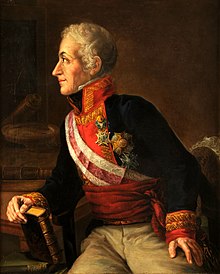Gabriel Ciscar y Ciscar
Gabriel José Ciscar y Ciscar (born March 16 or March 17, 1760 in Oliva near Valencia , Spain, † August 12, 1829 in Gibraltar ) was a Spanish scholar and naval officer who served in the War of Liberation against Napoleon and during the Trienio Liberal in 1823 as a Spanish Regent ruled.
Life
Ciscar came from a family of scholars from Oliva; his uncle was Gregorio Mayans y Siscar . Gabriel attended the Escuela Pía in Valencia and began studying law at the University of Valencia at the age of fourteen .
In 1777 he joined the Spanish Navy as a midshipman in Cartagena (Spain) . It was used in the Mediterranean and the Atlantic. In 1782 he continued his studies at the Cartagena Cadet Academy. He turned out to be very gifted for science.
Soon he was teaching navigation and mathematics at the Cadet Academy. He married Ana Agustina Berenguer de Marquina y Ansoategui in Cádiz in September 1787, the daughter of Félix Berenguer de Marquina , a conservative teacher at the academy who would later serve as viceroy of New Spain .
In 1788 Gabriel Ciscar received the rank of lieutenant at sea and rose to head of the cadet academy. He revised and expanded the standard work of the Spanish Navy on navigation at sea, Examen marítimo by Jorge Juan y Santacilia . In 1792 he was promoted to frigate captain.
In 1796 he traveled to Tripoli and calculated the longitude of several points on the south coast of Sardinia . In 1798 he was appointed captain of the sea and commander of the artillery of Cartagena and sent him together with Agustín de Pedrayes as representative of Spain to Paris, where the basic units of the metric system were to be agreed.
In Spain he advocated the use of the new uniform weights and measures and suggested their Spanish names. Upon his return he became the commandant of the Naval Artillery of Cadiz. In 1805 he was promoted to brigadier general and was responsible for the entire artillery of the royal navy. He received the order of Charles III. and was appointed captain of the Cartagena Naval Cadet Company in February 1808.
In 1808, the French under Napoleon Bonaparte held the newly crowned Spanish King Ferdinand VII prisoner in exile. In the war of liberation against Napoleon , the junta Suprema Central organized the resistance and conducted the state business. After the convening of the Cortes of Cadiz , a regency ( Consejo de Regencia ) was supposed to take over the executive tasks.
Ciscar became spokesman for the General Militar Junta and secretary of the Supreme War Council in Seville at the end of December 1808. He took over the post of governor of Cartagena and naval commander. In 1810 he was appointed to the State Council and appointed naval representative. Ciscar was appointed regent of the Spanish kingdom by the Cortes in October 1810, together with Joaquín Blake y Joyes and Pedro Agar y Bustillo .
Government activity was essentially limited to continuing the war with the support of Portugal and England . The reign ended in 1812. After the Constitution of Cadiz was passed , he reigned provisional as Regent of the Regencia from 1813 to 1814 , this time together with Pedro Agar and Cardinal Luis María de Borbón y Vallabriga .
When King Ferdinand returned from exile, the constitution was revoked and absolutist rule was resumed, Ciscar was imprisoned immediately. He was initially held captive in Murcia (city) and Cartagena, from 1815 he was allowed to stay in his hometown of Oliva.
In the course of the liberal revolution of 1820, he was released and promoted to lieutenant general. He was made a member of the Council of State in Madrid.
In 1823 French troops invaded Spain under the Duke of Angoulême on behalf of the Holy Alliance in order to regain the absolutist order. In March 1823 the parliament moved its seat to Seville and set up a Regency Council because the king was unable to carry out his duties. This council consisted of Cayetano Valdés , Gaspar de Vigodet and Ciscar.
When King Ferdinand regained his absolutist rights with the help of the French army at the end of 1823, Ciscar was sentenced to death and all his property confiscated. He fled to British-occupied Gibraltar, where Duke Wellington granted him a pension.
There he devoted himself to scientific writing until his death. Among other things, he wrote a poema físico-astronómico in verse .
Web links
- Biography (spanish)
- Biography (spanish)
- Entry at geneall.net
| personal data | |
|---|---|
| SURNAME | Ciscar y Ciscar, Gabriel |
| ALTERNATIVE NAMES | Císcar y Císcar, Gabriel José (alternative spelling) |
| BRIEF DESCRIPTION | Spanish scholar, naval officer and regent |
| DATE OF BIRTH | uncertain: March 16, 1760 or March 17, 1760 |
| PLACE OF BIRTH | Oliva (Valencia) , Spain |
| DATE OF DEATH | August 12, 1829 |
| Place of death | Gibraltar |
